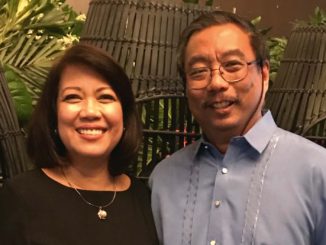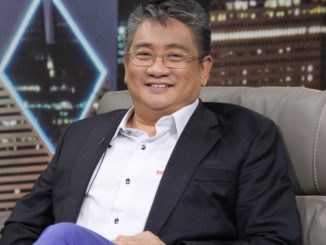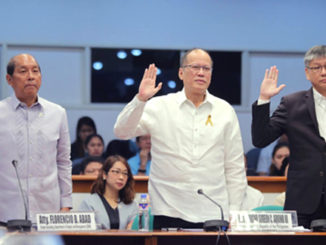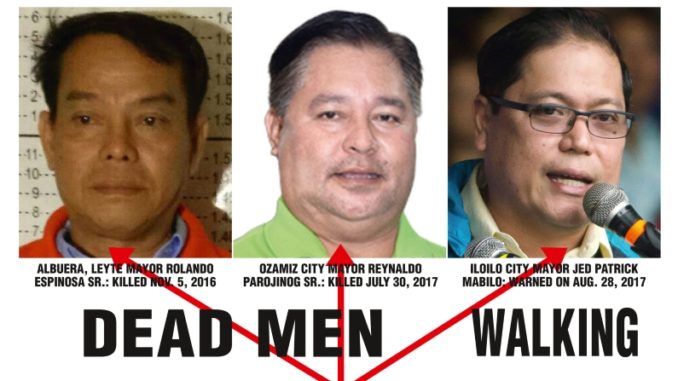
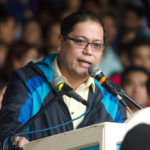
Iloilo City Mayor Jed Patrick Mabilog is a dead man walking.
His fate was sealed Monday (Aug. 28), the National Heroes Day, when President Duterte announced the assignment of Police Chief Inspector (Major) Jovie Espenido to Iloilo City. The President minced no words in declaring that Mayor Mabilog remains a protector of illegal drugs. Duterte had previously described Iloilo as the most “shabulized” city in the Philippines, meaning a place where illegal drugs are at their most rampant.
Previously, in two cities where Espenido was assigned, the mayors, Rolando Espinosa Sr. of Albuera, Leyte, and Mayor Reynaldo Parojinog of Ozamiz City, were killed by police raiders, both in alleged shootouts. The mayors were identified by Duterte as the “big fish” of illegal drugs.
So now that Espenido is going to Iloilo, Duterte has asked the relevant and urgent question about Mabilog’s future: “Mabuhay kaya siya?” (Will he live?).
Duterte solved his own query. Mabilog would die if he was still a drugs protector, implying he had given the mayor ample time to reform himself. Espenido has indicated a similar sentiment, saying anyone engaged in illegal drugs and resisting authorities would be killed.
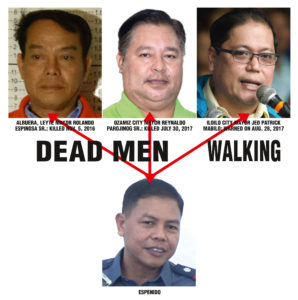
Mayor Mabilog pretends to be puzzled by the assignment of Espenido to Iloilo. But he knows his fate is sealed. “I am puzzled that Chief Inspector Espenido is being assigned here, and that the President has again mentioned my name. But if that is his directive, then I will work closely and cooperate with Chief Inspector Espenido in completely wiping out the remnants, if there are still any, of the illegal drug syndicate in Iloilo City,” he said in a statement.
For his part, a political ally and second cousin of Mabilog, Senator Frank Drilon fretted that Espenido’s detail at Iloilo City “is a cause for concern”. Mabilog is an award-winning mayor for his work as hizzoner (since 2010) of Iloilo City, giving him an aura of an absolutely confident but sometimes aloof public official.
Another person whose time is probably up, not in a deadly metaphor though, is Ombudsman Conchita Carpio Morales.
In a rambling 50-minute speech Tuesday (Aug. 29) at the presidential palace addressing newly inducted government officials, Duterte delivered his most scathing criticism yet against the feisty lady ombudsman.
Devoting about 20 of his 50-minute speech to the tenure and recent actuations of the Ombudsman, Duterte bluntly accused Morales of bias and partiality.
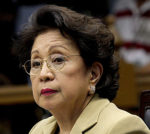
Duterte said he felt pity for jailed former Senators Jinggoy Estrada and Bong Revilla (although their names were not mentioned) who have repeatedly been refused bail by the Ombudsman. “The measure or standard of granting bail and other legal remedies—give it to the others and to your enemies,” said the President who was himself a prosecutor at the Department of Justice for nine years before becoming a politician who never lost an election.
To Ombudsman Morales, Duterte asked, “Why can’t we just we wind up the cases against the senators?”, implying that the Ombudsman should expedite their anti-graft cases for the sake of due process and fairness.
Duterte said the Office of the Ombudsman has a batting average of conviction (in graft cases) of “two-to-8—8 acquittal.” The anti-graft prosecutor files “so many cases”, not really to seek conviction “but just to have an output at great expense on human emotion.”
“I was once also a—accused before the Ombudsman,” he recalled. Pausing, he exclaimed: “They are really corrupt! I am telling you. I can bring forth the record.” The then Davao mayor was asked for a bribe. “I did not agree to give,” he said. “I went up to the Supreme Court (to gain acquittal) but at great expense — for my lawyer.”
“The enemy of the Ombudsman’s friend is the Ombudsman’s enemy too. This is how I see it from where I stand,” Duterte mocked of the Ombudsman.
He said Carpio-Morales’ brother is his balae, being the father-in-law of his daughter Inday Sara Duterte, the incumbent mayor of Davao City.
The President reminded Mrs. Morales “your hold to the office is very, very precarious. You’re so supposed to serve the remaining term of the guy who resigned, not to a full-term. That is very clear under the law.”
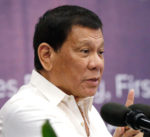
“The Office of the Ombudsman stresses the importance of due process of law. Yet it cannot act on complains with the cold neutrality of an impartial tribunal, which is specifically required in due process. It seems that the Office of the Ombudsman has mastered the art of selective justice,” Duterte sneered.
“It is slow to act on complaints against the friendly but quick to decide against perceived hostiles,” he added, using military terms in fighting terrorism.
Denouncing the justice system, Duterte exclaimed, “there is something terribly wrong with our country, very, very wrong!”
“The wheels of justice grind to a halt when those tasked to dispense (justice) have friends to serve and debts of gratitude to pay, no matter what. The lack of moral courage to do what is right and act beyond those twin failings, end in inequitable decisions,” the President said, reading from a prepared portion of his speech.
“Scratch my back and I’ll scratch yours. Here’s how some people describe it. It is to me detestable,” he lamented.
Duterte recalled his inaugural speech on June 30, 2016.
“The one principle of governance I abide with in running the affairs of my administration is contained in the saying, thus: “I have no friends to serve, I have no enemies to harm. I am beholden to no one save my conscience.”
In his Aug. 29 speech, Duterte pleaded to Morales: “I can only wish that Ombudsman would go beyond friendship bonds and adopt (this) often-quoted principle as a governing rule in the performance of its constitutional mandate.”

